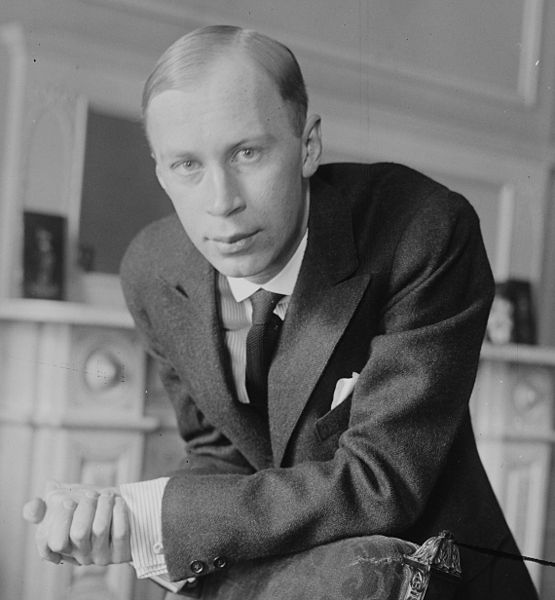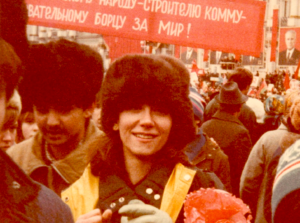 Several days of compiling prose about the music of Sergei Prokofiev, the topic of our July Composer-of-the-Month resource, threw me back to a time when my heart belonged solely to his music.
Several days of compiling prose about the music of Sergei Prokofiev, the topic of our July Composer-of-the-Month resource, threw me back to a time when my heart belonged solely to his music.
From early teens, my goal became to study and perform every piece of piano music Prokofiev wrote (and there was a lot!). As things unfolded, I managed to get most of his nine glorious piano sonatas, several of his character works (like Toccata and Visions Fugitive), and two of his amazing piano concerti under my belt, performing them in various recitals and concerts. Looking back on that, I gasp, knowing full well that I could not do it today. But, ah, that is youth, is it not?
My love of Prokofiev’s music then took a different direction, I desired to write my dissertation about him, perhaps his eighth or ninth piano sonata, or perhaps his Piano Concerto No. 5, which I adored. Or maybe I could concentrate on his astonishing experiences as a student of the St. Petersburg Conservatory in the years leading up to World War I.
But proposing Prokofiev as a topic for research when applying for an IREX grant to the USSR in 1979 was foolish, unless I wished to re-spout the preset ideological information already floating around or could content myself being in Leningrad yet excluded from most archives. Instead, I proposed a topic that would put up fewer obstacles to receiving the highly competitive grant and would lie beneath the radar of the “modern-day” censors (archival staff and official advisors): a study of a late-eighteenth-century Ukrainian serf composer who worked for the absurdly wealthy noble family of the Sheremetevs.
Stepan Degtiarev was brought from Ukraine as a boy, trained in choral singing and most aspects of music needed to serve that family. He then received a bonus of additional education in Bologna, Italy—exactly the polished training Mozart had gotten there two generations earlier.
Afterwards, Degtiarev returned to his status as serf-musician (not pleasant, but unavoidable) to write sacred music for the Sheremetev’s various chapels and oversee musical events at their several palaces. He also, surprisingly, penned two innovative, Western-styled, Russian-themed patriotic oratorios—the oratorio being a genre not found in Russian music, but rather imported from slews of Italian composers popular during that era.
Degtiarev finally did earn his freedom from serfdom (as serfs sometimes did), but poverty drove his wife to petition after his death for a return to serf status for financial survival. Not the prettiest picture, is it?
But you can see how Degtiarev’s music, laced to the external trappings of his biography, made a good ideological match with the Soviet narrative (aristocrats bad; impoverished, oppressed workers good). Quite frankly, few would have paid any attention to Degtiarev in Soviet Russia otherwise.

So armed with the probability that research into Degtiarev would open the necessary archives and even allow me to work in two remarkable summer palaces owned by the Sheremetevs—Ostankino and Kuskovo, off I went to the USSR, blessed by that grant and both Soviet and US State Department permission.
One day I may write in depth about that first year in the USSR. No matter how prepared I thought I was, it was like climbing a 90° mountainside. All of us have such watershed years. Few of us feel prepared going through them, particularly when everything we know is swept out from under our feet and we find ourselves in a new set of circumstances (ask a first-time mom about that, to bring the example closer to home).
After those years, while I still played some of Prokofiev’s music, my focus shifted to academic efforts. The position in music history at SMU opened up (another wild story) and there I was, slugging it out, as all new professors do. The careful work that had consumed the previous four years of my life felt largely useless to me, faced with the reality of course loads and university assignments.
Much has changed in the “Prokofiev landscape” since those days. The old-style biographies in Russian and English that existed back in my day are largely obsolete. More accurate pictures of his music and life opened with Harlow Robinson’s 1987 Sergei Prokofiev: A Biography. The curtains were starting to part by then, with measured access to the real information granted to researchers. Once communism released its stranglehold on every aspect of Russian society, even more doors were blasted open.
Then began heady times for Prokofiev research. David Nice’s Prokofiev—A Biography: From Russia to the West (Yale, 2003) covers his life from birth through his schooling, into the years after leaving Russia in distress at the upheavals of the Bolshevik Revolution. He tried unsuccessfully to establish himself in America (for two years), then found an unsatisfying life in Europe, primarily in Paris. Prokofiev’s decision to return to Moscow, made in the mid 1930s, was arguably ill-advised. That’s one of the stories we tell on the Composer page, so I won’t spill it. To learn even more, this electrifying story is told in detail by Simon Morrison in The People’s Artist: Prokofiev’s Soviet Years (Oxford, 2009).
It gladdens my heart to see these books available in English, as well as a barage of articles freely researched. If you exploring these writing, you will encounter difficult aspects of Prokofiev’s life, especially personal decisions he made regarding his family. Still, it’s hard to put ourselves in his (or anyone’s) shoes amidst the strain of functioning in Stalin’s Russia. Furthermore, it is the music of Prokofiev we care about. Biography is of secondary, or tertiary, interest, useful primarily once a person knows the music and can bring his or her own life experience to the subject.
And insofar as that music, Peter and the Wolf is surely Prokofiev’s best-known work and one of the Western canon’s most significant masterpieces. It has reached an enormous number of children’s ears and given them what may be their only connection to the symphony orchestra. Expanding from that, take a marvelous dip into his two ballets: either the hilarious, pungent Cinderella or his ravishingly beautiful score for Romeo and Juliet. Either one of these, or both, will immerse you into Prokofiev’s musical vocabulary, and bring you the grand combination of goose bumps, laughter, excitement, and tears.
For myself, the words on the Prokofiev page for July will have to suffice for now. Other projects are calling. But I may haul out my tattered volume of his nine sonatas for piano. Am I brave enough to do that? That’s a good question. Occasionally I listen to recordings on cassettes from my playing days and think two things: “yikes, oh dear, no, hmm” and “Wow, was I really that good a pianist back then?” Both of those responses, I think, are the ones we have, looking back on the achievements of our teens, 20s, and 30s. Or so it seems to me on this beautiful sunny, final day of June.
So, as we all move into July, try to find a good performance of Cinderella (seems perfect for summer) or listen to his wild, virtuosic romp—otherwise known as Piano Concerto No. 1. It’s not long, and it’s fun. Ramp up that romp and experience his Concerto No. 3. Or, for atmosphere and something briefer, consider his set of Visions Fugitive. For more excitement, get wowed by his Sonatas 6 and 7, two of the three known as the “War Sonatas” (a reference to the time period of World War II). And then there are his symphonies, his glorious chamber music (brilliant violin & piano sonatas, a gorgeous sonata for flute and piano), and string quartets. A list of songs and choral pieces exists too, some of which were truly schlock, but essential for surviving under Communism. And, wait, don’t forget his groundbreaking score to the landmark Alexander Nevsky—a major stepping stone in the arena of film scores.
One last thing: if you can listen to the slow movement (Larghetto) of his Concerto No. 5 and not tear up, please tell me how you did it. I know no more perfect example of what melody woven into a shifting, shimmering texture can do for the ear and the soul.



